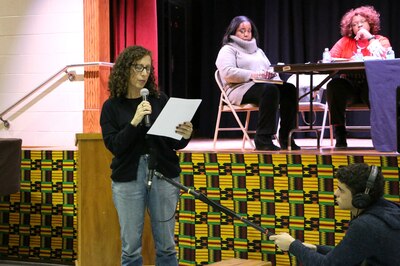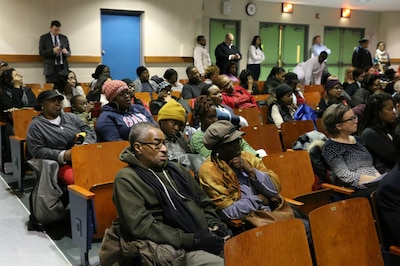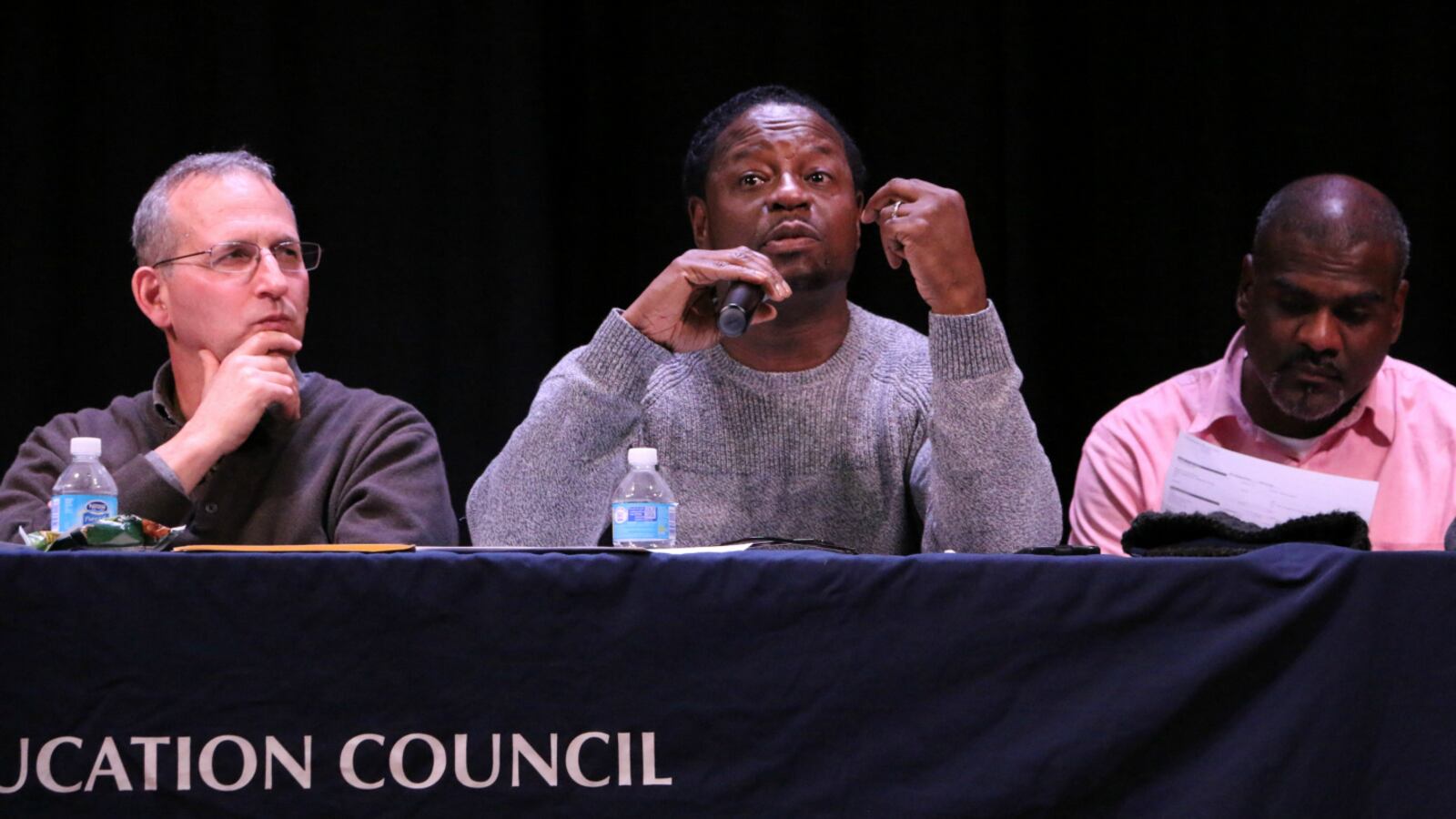Parent leaders in gentrifying Brooklyn narrowly approved a contentious rezoning plan Tuesday that has brought widespread attention to the deep race and class divisions between neighboring schools in some parts of the city.
After a weeks-long delay to give officials more time to meet with affected families, the community education council in Brooklyn’s District 13 voted 6-3 to approve the zone change for next fall. As a result, some families who would have been eligible for kindergarten spots at popular but jam-packed P.S. 8 in Brooklyn Heights will now be shifted to lower-performing P.S. 307 in nearby Vinegar Hill, which has many open seats.
While the plan was designed to relieve the overcrowding at P.S. 8 that has intensified as the school’s popularity has grown and more families have moved into its sprawling zone, it could also have the effect of diversifying P.S. 307. That school serves mostly low-income black and Hispanic students, including many who live in adjacent public housing, while the majority of P.S. 8 students are white and many are wealthy.
The plan triggered a backlash both from current P.S. 307 parents and some who would be rerouted there, illustrating the challenges of integrating a school even when it is surrounded by a mix of families. As Mayor Bill de Blasio has faced rising calls to address the lack of diversity at many schools in New York City — which is one of the nation’s most segregated districts — this rezoning battle and a similar one in the Upper West Side have come to epitomize just how difficult that will be.
But for all the fierce debates this zone change stirred up since it was proposed in September, its immediate effects could be limited. While it will shrink P.S. 8’s lengthy waitlist, the building will still be filled far above capacity. And it is possible that many would-be P.S. 8 parents who are now matched with P.S. 307 will choose not to enroll there, leaving both schools nearly as segregated as before.
“I don’t believe we’re going to make as much history as we say,” said Ben Greene, a CEC13 member and P.S. 307 parent, before he voted against the plan late Tuesday evening.
The city’s proposal came after P.S. 8 has had to cut its pre-kindergarten program and repurpose its arts classrooms to free up space for a steady stream of new students. Now at 140 percent of its intended capacity, the school last year had to place 50 prospective kindergarten students on a waitlist.
The rezoning will shrink P.S. 8’s catchment area – which spans from Brooklyn Heights to the Navy Yard – and expand P.S. 307’s, which is now just a fraction of the size of P.S. 8’s. Even though P.S. 307 draws many students from outside its current zone, it still cannot fill all its seats.
While the plan might make logistical sense, many parents rejected it.

Some P.S. 307 parents and residents of the Farragut Houses, who have long sent their children to that school, worried that an influx of wealthy newcomers could change the school’s character and jeopardize its federal Title I funding, which is tied to the share of needy students it enrolls. In response to those concerns, the city has said it will allow the school to reserve a portion of its seats for low-income students.
At heated public hearings, long-time residents of the area made clear that they saw the rezoning as an extension of the gentrification that has transformed the neighborhoods around the schools. Even though P.S. 307’s expanded zone retains the Farragut Houses (and actually adds more of its buildings), some residents feared that their children would be forced out as families from high-priced enclaves like DUMBO are let in.
“We have all new kinds of folks coming into town,” Farragut resident Deborah Stewart said at Tuesday’s meeting, “but the people who have been here deserve the right to have the same access to what’s being made available.”
For their part, some DUMBO parents who were set to be rezoned for P.S. 307 expressed concerns about the school’s safety record and its test scores, which fall far below the city average (though they are comparable to those at schools that serve students from similar backgrounds). Some P.S. 307 parents took offense to this, and felt that racial biases fueled some of the fears about the school, where 90 percent of students are black or Hispanic and only five percent are white. (At P.S. 8, 60 percent of students are white.)
“It makes some of these parents uncomfortable when they walk into a classroom and it’s all black and Latino,” said Faraji Hannah-Jones, co-president of P.S. 307’s parent-teacher association.

It remains to be seen whether parents who had planned to send their children to P.S. 8 will enroll them in P.S. 307 now simply because the zoned lines have changed. Instead, some may try to secure a spot for their children in gifted and talent programs or charter schools, or decide to pay for private school, said Clara Hemphill, the founding editor of Insideschools, who is studying school segregation in New York.
“I don’t get the impression that there’s a bunch of DUMBO parents who are breaking down the door to get into 307,” she said, noting that P.S. 307 has struggled to fill its pre-K seats, which are already open to students outside its zone.
Parents who are affected by the rezoning will have little time to weigh their options. Because the vote was postponed, the kindergarten enrollment process for next year is already underway, and ends Jan. 15.
Education department spokeswoman Devora Kaye said the city will help both schools and their families transition to the new zones.
Ansley Samson, a member of P.S. 8’s parent-teacher association, said her school plans to partner with P.S. 307 during that process to “bridge the distance” between their two communities, which only seemed to widen during the high-profile rezoning debate.
“Being under the microscope has created more division,” she said. “I wish we had been able to find a way, all of us, to come together.”

